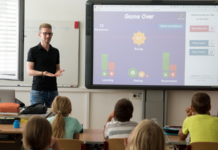If you ever saw the animated Disney TV show Recess, you may have a slightly skewed view of what a kindergartener looks like.
Of course, it’s not that horrific!
Kindergarten teachers undoubtedly play a vital role in a child’s education, helping to lay the foundation for their future learning and development. However, the path to becoming a teacher for this age group differs from some of the other ways you get access to teaching children.
So, here are some of the best steps you can take to become a kindergarten teacher.
Get a Bachelor’s Degree
Most states require a minimum of a bachelor’s degree in early childhood education or another similar field to become a licensed kindergarten teacher. These programs typically focus on child development, curriculum planning, teaching methods, and classroom management.
There is even Canva for teachers online which can help you to train in this area and will help you learn about ways to collaborate in the classroom and beyond with young kids.
Complete a Teacher Preparation Program
In addition to obtaining a bachelor’s degree, you will need to complete a teacher preparation program that includes student teaching experience. This will provide you with hands-on experience working with young children and help you develop the skills you need to be an effective teacher. This, in the modern setting, will also likely involve a special educational needs portion, which will allow you to build on your ability to communicate with children who may have additional needs.
Obtain State Licensure
Once you have completed your education and teacher preparation program, you will need to obtain state licensure in order to teach in a public school. This typically involves passing a series of exams that test your knowledge of teaching methods, child development, and other related topics. These exams will usually involve a person standing at the back of the class while you teach and assessing your communication skills, as well as how you handle the classroom and answer questions. So, a bit intimidating, but it is not as bad as you may think!
Gain Experience
While completing your education and licensure requirements, it’s a good idea to gain experience working with young children in a variety of settings. This can include volunteering at a local preschool or daycare, working as a nanny or babysitter, or even tutoring young children in your spare time. This will help you develop the skills and confidence you need to be an effective kindergarten teacher, as well as help you establish which rules you may think will help you to develop as someone who works with kids.
Continue Professional Development
Even after you become a kindergarten teacher, it’s important to continue your professional development by attending conferences, workshops, and other training opportunities. This will help you stay up-to-date on the latest teaching methods and strategies and ensure that you are providing your students with the best possible education.
It will also help you develop your skills relating to students who may have more specific needs, such as younger children who may have autism spectrum disorder, ADHD, or oppositional defiant disorder.







